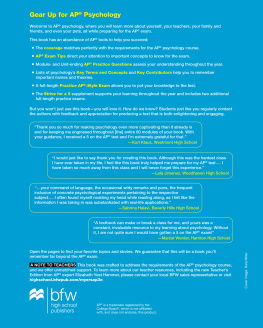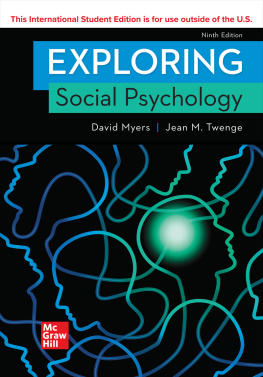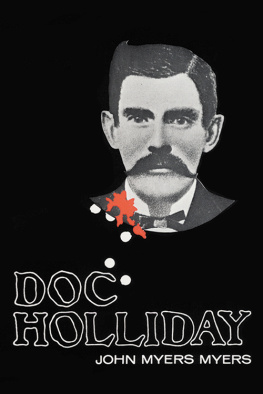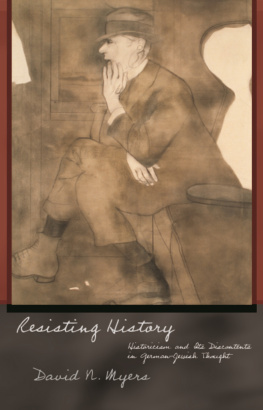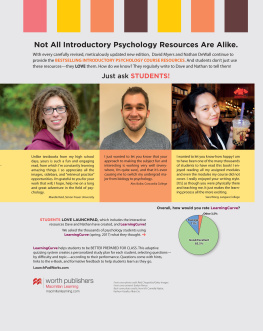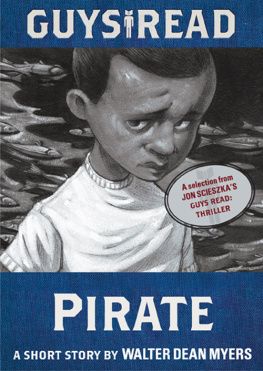David G. Myers - Myers’ Psychology for AP®, Third Edition
Here you can read online David G. Myers - Myers’ Psychology for AP®, Third Edition full text of the book (entire story) in english for free. Download pdf and epub, get meaning, cover and reviews about this ebook. year: 2018, publisher: Macmillan Higher Education, genre: Children. Description of the work, (preface) as well as reviews are available. Best literature library LitArk.com created for fans of good reading and offers a wide selection of genres:
Romance novel
Science fiction
Adventure
Detective
Science
History
Home and family
Prose
Art
Politics
Computer
Non-fiction
Religion
Business
Children
Humor
Choose a favorite category and find really read worthwhile books. Enjoy immersion in the world of imagination, feel the emotions of the characters or learn something new for yourself, make an fascinating discovery.
- Book:Myers’ Psychology for AP®, Third Edition
- Author:
- Publisher:Macmillan Higher Education
- Genre:
- Year:2018
- Rating:3 / 5
- Favourites:Add to favourites
- Your mark:
- 60
- 1
- 2
- 3
- 4
- 5
Myers’ Psychology for AP®, Third Edition: summary, description and annotation
We offer to read an annotation, description, summary or preface (depends on what the author of the book "Myers’ Psychology for AP®, Third Edition" wrote himself). If you haven't found the necessary information about the book — write in the comments, we will try to find it.
Myers’ Psychology for AP®, Third Edition — read online for free the complete book (whole text) full work
Below is the text of the book, divided by pages. System saving the place of the last page read, allows you to conveniently read the book "Myers’ Psychology for AP®, Third Edition" online for free, without having to search again every time where you left off. Put a bookmark, and you can go to the page where you finished reading at any time.
Font size:
Interval:
Bookmark:
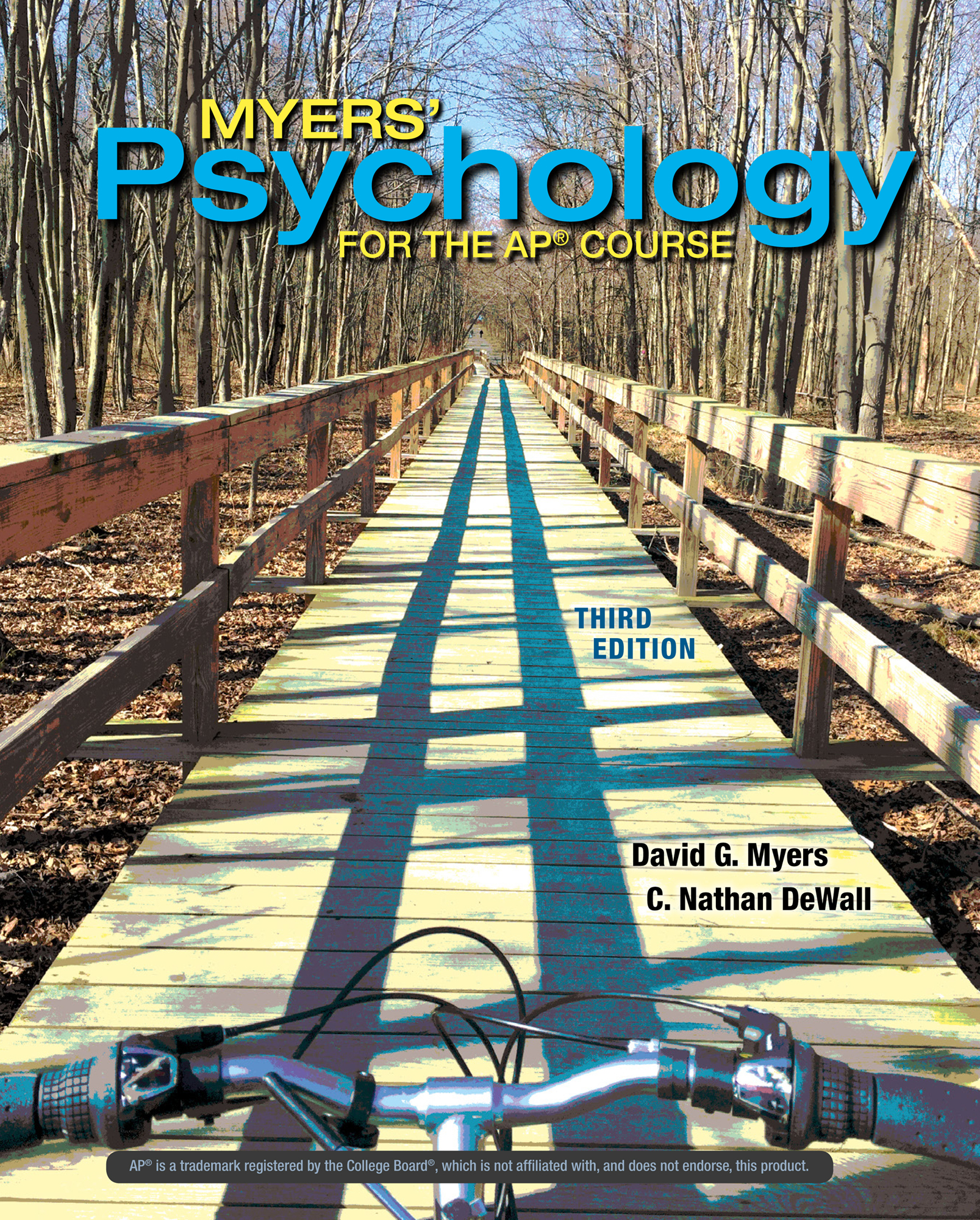
The content on the book cover reads: Myers Psychology For The A P Course. Third Edition. David G. Myers. C. Nathan DeWall. A P is a trademark registered by the College Board, which is not affiliated with, and does not endorse, this product. The spine of the book reads, Myers. DeWall. Myers Psychology For The A P Course. Third Edition. b f w publishers logo is shown at the bottom of the spine.
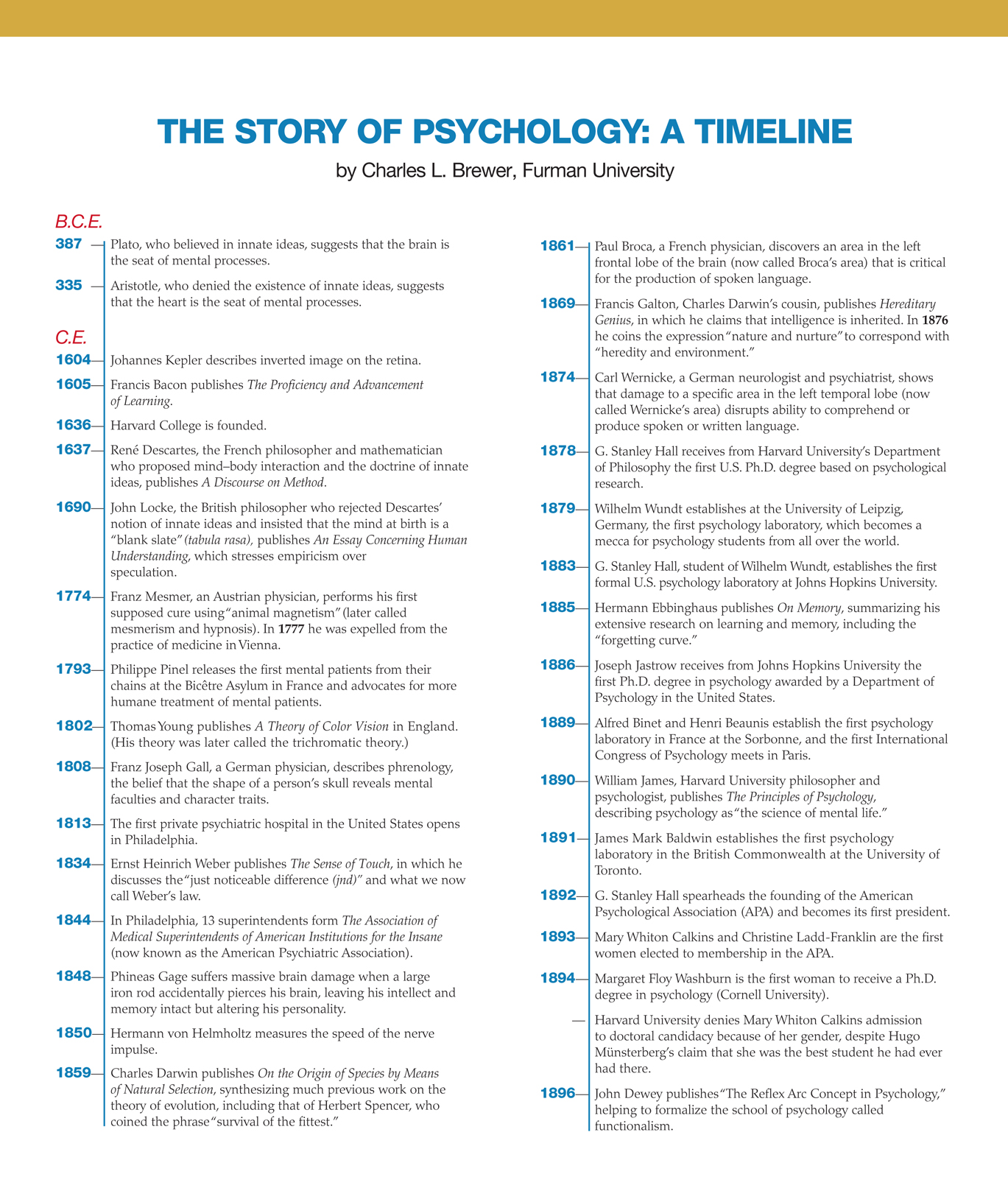
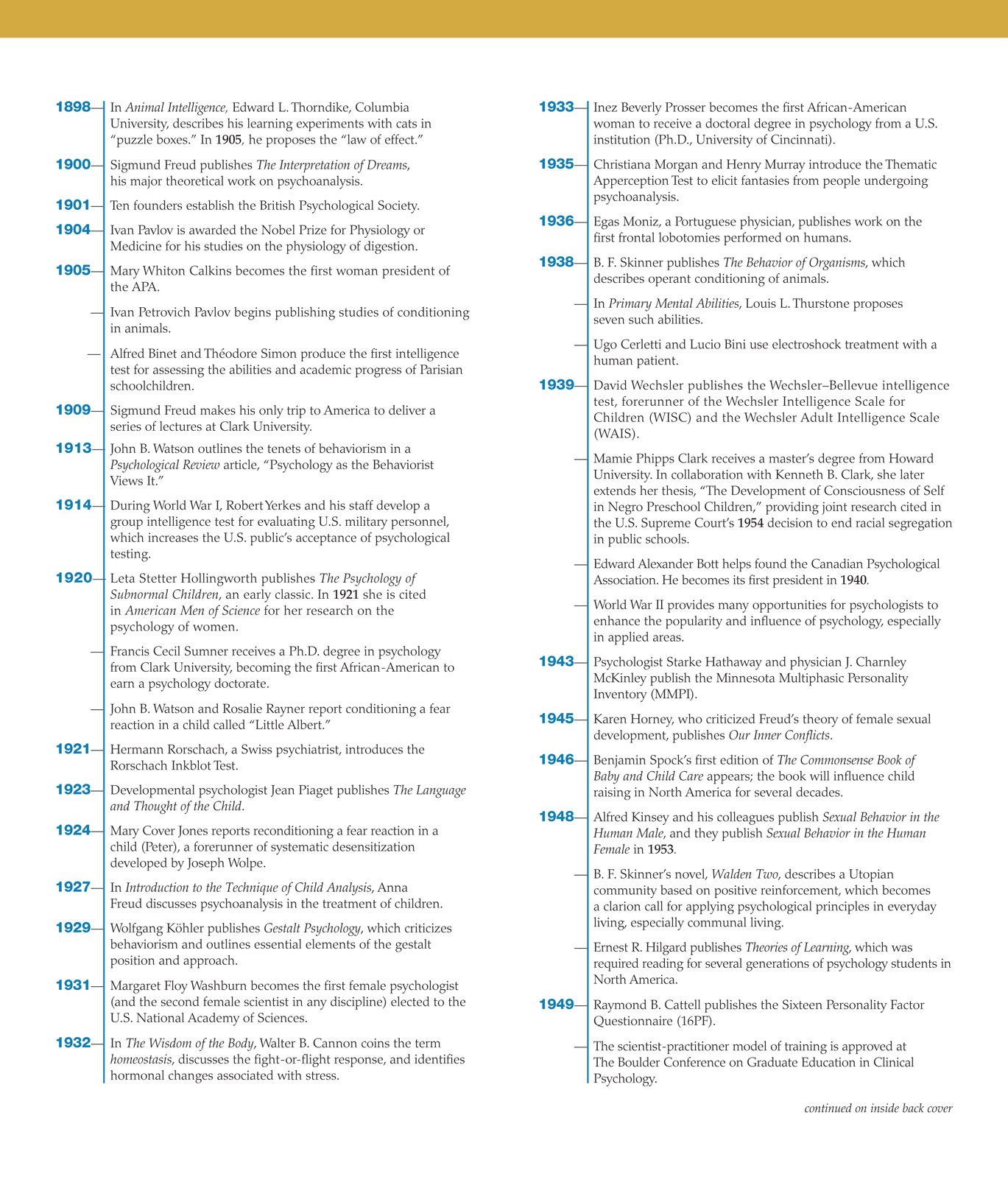
THE STORY OF PSYCHOLOGY: A TIMELINE
by Charles L. Brewer, Furman University
B.C.E.
387 Plato, who believed in innate ideas, suggests that the brain is the seat of mental processes.
335 Aristotle, who denied the existence of innate ideas, suggests that the heart is the seat of mental processes.
C.E.
1604 Johannes Kepler describes inverted image on the retina.
1605 Francis Bacon publishes The Proficiency and Advancement of Learning.
1636 Harvard College is founded.
1637 Ren Descartes, the French philosopher and mathematician who proposed mind-body interaction and the doctrine of innate ideas, publishes A Discourse on Method.
1690 John Locke, the British philosopher who rejected Descartes notion of innate ideas and insisted that the mind at birth is a blank slate (tabula rasa), publishes An Essay Concerning Human Understanding, which stresses empiricism over speculation.
1774 Franz Mesmer, an Austrian physician, performs his first supposed cure using animal magnetism (later called mesmerism and hypnosis). In 1777 he was expelled from the practice of medicine in Vienna.
1793 Philippe Pinel releases the first mental patients from their chains at the Bictre Asylum in France and advocates for more humane treatment of mental patients.
1802 Thomas Young publishes A Theory of Color Vision in England. (His theory was later called the trichromatic theory.)
1808 Franz Joseph Gall, a German physician, describes phrenology, the belief that the shape of a persons skull reveals mental faculties and character traits.
1813 The first private psychiatric hospital in the United States opens in Philadelphia.
1834 Ernst Heinrich Weber publishes The Sense of Touch, in which he discusses the just noticeable difference (jnd) and what we now call Webers law.
1844 In Philadelphia, 13 superintendents form The Association of Medical Superintendents of American Institutions for the Insane (now known as the American Psychiatric Association).
1848 Phineas Gage suffers massive brain damage when a large iron rod accidentally pierces his brain, leaving his intellect and memory intact but altering his personality.
1850 Hermann von Helmholtz measures the speed of the nerve impulse.
1859 Charles Darwin publishes On the Origin of Species by Means of Natural Selection, synthesizing much previous work on the theory of evolution, including that of Herbert Spencer, who coined the phrase survival of the fittest.
1861 Paul Broca, a French physician, discovers an area in the left frontal lobe of the brain (now called Brocas area) that is critical for the production of spoken language.
1869 Francis Galton, Charles Darwins cousin, publishes Hereditary Genius, in which he claims that intelligence is inherited. In 1876 he coins the expression nature and nurture to correspond with heredity and environment.
1874 Carl Wernicke, a German neurologist and psychiatrist, shows that damage to a specific area in the left temporal lobe (now called Wernickes area) disrupts ability to comprehend or produce spoken or written language.
1878 G. Stanley Hall receives from Harvard Universitys Department of Philosophy the first U.S. Ph.D. degree based on psychological research.
1879 Wilhelm Wundt establishes at the University of Leipzig, Germany, the first psychology laboratory, which becomes a mecca for psychology students from all over the world.
1883 G. Stanley Hall, student of Wilhelm Wundt, establishes the first formal U.S. psychology laboratory at Johns Hopkins University.
1885 Hermann Ebbinghaus publishes On Memory, summarizing his extensive research on learning and memory, including the forgetting curve.
1886 Joseph Jastrow receives from Johns Hopkins University the first Ph.D. degree in psychology awarded by a Department of Psychology in the United States.
1889 Alfred Binet and Henri Beaunis establish the first psychology laboratory in France at the Sorbonne, and the first International Congress of Psychology meets in Paris.
1890 William James, Harvard University philosopher and psychologist, publishes The Principles of Psychology, describing psychology as the science of mental life.
1891 James Mark Baldwin establishes the first psychology laboratory in the British Commonwealth at the University of Toronto.
1892 G. Stanley Hall spearheads the founding of the American Psychological Association (APA) and becomes its first president.
1893 Mary Whiton Calkins and Christine Ladd-Franklin are the first women elected to membership in the APA.
1894 Margaret Floy Washburn is the first woman to receive a Ph.D. degree in psychology (Cornell University).
Harvard University denies Mary Whiton Calkins admission to doctoral candidacy because of her gender, despite Hugo Mnsterbergs claim that she was the best student he had ever had there.
1896 John Dewey publishes The Reflex Arc Concept in Psychology, helping to formalize the school of psychology called functionalism.
1898 In Animal Intelligence, Edward L. Thorndike, Columbia University, describes his learning experiments with cats in puzzle boxes. In 1905, he proposes the law of effect.
1900 Sigmund Freud publishes The Interpretation of Dreams, his major theoretical work on psychoanalysis.
1901 Ten founders establish the British Psychological Society.
1904 Ivan Pavlov is awarded the Nobel Prize for Physiology or Medicine for his studies on the physiology of digestion.
1905 Mary Whiton Calkins becomes the first woman president of the APA.
Ivan Petrovich Pavlov begins publishing studies of conditioning in animals.
Alfred Binet and Thodore Simon produce the first intelligence test for assessing the abilities and academic progress of Parisian schoolchildren.
1909 Sigmund Freud makes his only trip to America to deliver a series of lectures at Clark University.
1913 John B. Watson outlines the tenets of behaviorism in a Psychological Review article, Psychology as the Behaviorist Views It.
1914 During World War I, Robert Yerkes and his staff develop a group intelligence test for evaluating U.S. military personnel, which increases the U.S. publics acceptance of psychological testing.
1920 Leta Stetter Hollingworth publishes The Psychology of Subnormal Children, an early classic. In 1921 she is cited in American Men of Science for her research on the psychology of women.
Francis Cecil Sumner receives a Ph.D. degree in psychology from Clark University, becoming the first African-American to earn a psychology doctorate.
John B. Watson and Rosalie Rayner report conditioning a fear reaction in a child called Little Albert.
1921 Hermann Rorschach, a Swiss psychiatrist, introduces the Rorschach Inkblot Test.
1923 Developmental psychologist Jean Piaget publishes The Language and Thought of the Child.
Font size:
Interval:
Bookmark:
Similar books «Myers’ Psychology for AP®, Third Edition»
Look at similar books to Myers’ Psychology for AP®, Third Edition. We have selected literature similar in name and meaning in the hope of providing readers with more options to find new, interesting, not yet read works.
Discussion, reviews of the book Myers’ Psychology for AP®, Third Edition and just readers' own opinions. Leave your comments, write what you think about the work, its meaning or the main characters. Specify what exactly you liked and what you didn't like, and why you think so.

